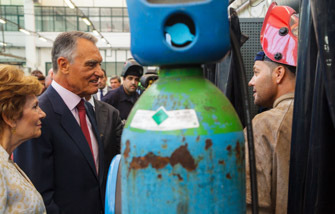
Mister Speaker,
Prime Minister,
Mayor of Porto,
President of the National Committee for the Commemorations of the Centenary of the Republic,
Ladies and Gentlemen,
I very warmly greet the city of Porto and its people, of whom Miguel Torga said:
“Those who die for freedom every century are capable of the most spontaneous civic fervour.”
At the dawn of 31 January 1891, the people of Porto rose, and ranged throughout these streets and squares with patriotic enthusiasm ready to sacrifice all for a civic ideal.
Recent international events had revealed the weaknesses of what was then Portugal. A famous republican, João Chagas stated, to the purpose: “... truth became suddenly known of the affairs of State.”
Stimulated with the ideals of righteousness, those generous men searched for an answer to the stalemate which was being suffered by Portugal.
The revolt was not successful at the time, but left seeds which bore fruit twenty years later, with the establishment of the Republic, in October 1910. The Republic whose centenary we commence commemorating today.
It is a time to remember. One hundred years later, with the thrills vanished, the antagonisms gone, this is the opportune moment to exercise the art of memory.
We are now able to ponder in fairness the hopes and the undertakings. Thanks to a century having gone by, we are now able to objectively assess the feats and defects flaunted by the First Republic, such as would have happened in any other regime.
The Republic was born in hope, but its existence, a short life of fifteen years and a few months, was very unsettled.
The republican tribunes knew how to disseminate their dream, such as the great pedagogue João de Deus wanted the Portuguese to learn to read: through “words which are said, which are heard, which are understood, which can be explained.”
Words of hope were proclaimed on several occasions throughout our History. Words such as Freedom, Democracy, Republic.
Whoever calls upon those words, whoever takes office in their name is supremely responsible before the people for what he does and for what he does not do.
We again live in democracy. We have more than doubled the length of the time of life of the regime commenced in 1910.
Precious are the days when it is possible to have hope reborn.
These Commemorations have an important role to accomplish. The issue is to insert the events of the past in the system of the life of a people and to understand them. To speak, hear, understand and explain.
Only so, respecting the due distancing and rejecting official versions of History, accepting a multiplicity of readings and interpretations, can we formulate judgements and extract lessons.
One thing I know as certain: the need we feel to commemorate the Republic shows that the past still lives with us, as a memory which is required to be alive and able to muster our feelings. We have the capability to change, to start anew each day, to always be a bit better, without placing everything in doubt.
I wish to congratulate Dr. Artur Santos Silva, as President of the Organizing Committee. He has known how to interpret, with dedication and sense of patriotism, the grand objectives that must guide the carrying out of this undertaking.
The Commemorations of the Centenary could be the seed of a new spirit of citizenship. The hundreds of initiatives which will be launched all over the Country, and which will be carried on beyond 2010, represent the ideal opportunity to revisit the values which bond republicanism with dedication to the Public Cause: the love for the Fatherland, ethics in public life.
I sincerely hope that these commemorations will be a factor for national mustering, capable of inspiring in the Portuguese of the 21st century the same spirit that moved the 31 January revolutionaries: a spirit made of non-conformism and hope, based on a wish for a better Portugal, more brotherly and with more solidarity.
Schools, local authorities and private institutions will be called upon to take part in multiple activities. This is a people’s celebration. Of all the people, without exception.
The virtue of democratic policy resides above all in its fitness, starting from divergence, to muster and create unity. Unity between past and future, unit in the present. Only thus can we promote convergence between the values of times past and the demands of adapting them to the new.
This was well understood by one of the first republicans, Guerra Junqueiro, when he defined as the project “not a doctrinaire republic, but one that is wide, true, national, where all will fit in.”
A fine ideal which, I am certain, the Commemorations will help to accomplish, at a moment when, as in few occasions in our History, we so much need to be united.
In the name of this collective hope called Portugal, I declare officially open the Commemorations of the Centenary of the Republic.
© 2006-2016 Presidency of the Portuguese Republic
You have gained access to the records of the Official Site of the Presidency of the Republic from 9 March 2006 to 9 March 2016.
The contents available here were entered in the site during the 10 year period covering the two mandates of President of the Republic Aníbal Cavaco Silva.